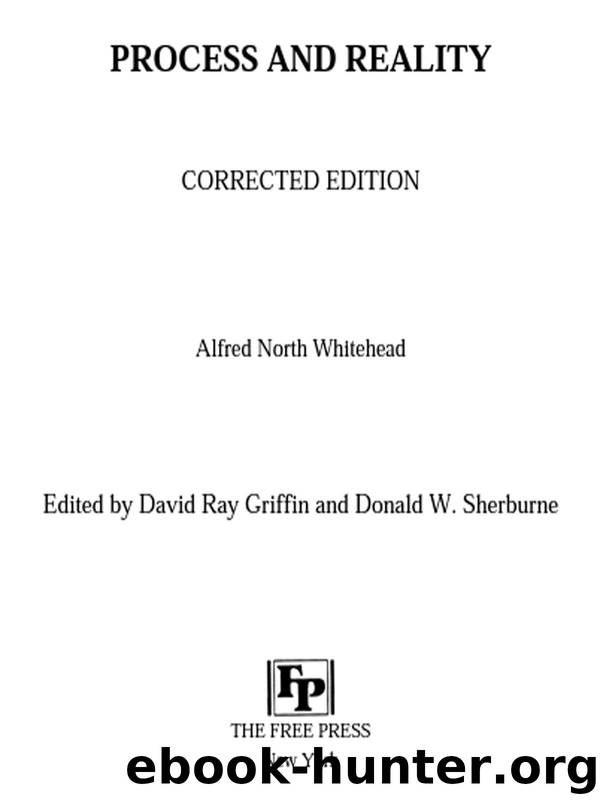Process and Reality (Gifford Lectures Delivered in the University of Edinburgh During the Session 1927-28) by Alfred North Whitehead

Author:Alfred North Whitehead [Whitehead, Alfred North]
Language: eng
Format: epub
Publisher: Free Press
Published: 2010-05-11T04:00:00+00:00
A metaphysical proposition—in the proper, general sense of the term† ‘metaphysical’—signifies a proposition which (i) has meaning for any actual occasion, as a subject entertaining it, and (ii) is ‘general,’ in the sense that its predicate potentially relates any and every set of actual occasions, providing the suitable number of logical subjects for the predicative pattern, and (iii) has a ‘uniform’ truth-value, in the sense that, by reason of its form and scope, its truth-value is identical with the truth-value of each of the singular propositions to be obtained by restricting the application of the predicate to any one set of logical subjects. It is obvious that, if a metaphysical proposition be true, the third condition is unnecessary. For a general proposition can only be true if this condition be fulfilled. But if the general proposition be false, then it is only metaphysical when in addition each of the derivate singular propositions is false. The general proposition would be false, if any one of the derivate singular propositions were false. But the third condition is expressed in the proposition without any dependence upon the determination of the proposition's truth or falsehood.
There can be no cosmic epoch for which the singular propositions derived from a metaphysical proposition differ in truth-value† from those of any other cosmic epoch.
We certainly think that we entertain metaphysical propositions: but, having regard to the mistakes of the past respecting the principles of geometry, it is wise to [301] reserve some scepticism on this point. The propositions which seem to be most obviously metaphysical are the arithmetical theorems. I will therefore illustrate the justification both for the belief, and for the residual scepticism, by an examination of one of the simplest of such theorems: One and one make two.2
Certainly, this proposition, construed in the sense ‘one entity and another entity make two entities,’ seems to be properly metaphysical without any shadow of limitation upon its generality, or truth. But we must hesitate even here, when we notice that it is usually asserted, with equal confidence as to the generality of its metaphysical truth, in a sense which is certainly limited, and sometimes untrue. In our reference to the actual world, we rarely consider an individual actual entity. The objects of our thoughts are almost always societies, or looser groups of actual entities. Now, for the sake of simplicity, consider a society of the ‘personal’ type. Such a society will be a linear succession of actual occasions forming a historical route in which some defining characteristic is inherited by each occasion from its predecessors. A society of this sort is an ‘enduring object.’ Probably, a simple enduring object is simpler than anything which we ordinarily perceive or think about. It is the simplest type of society; and for any duration of its existence it requires that its environment be largely composed of analogous simple† enduring objects. What we normally consider is the wider society in which many strands of enduring objects are to be found, a ‘corpuscular society.’
Now consider two distinct enduring objects.
Download
This site does not store any files on its server. We only index and link to content provided by other sites. Please contact the content providers to delete copyright contents if any and email us, we'll remove relevant links or contents immediately.
The remains of the day by Kazuo Ishiguro(8891)
Tools of Titans by Timothy Ferriss(8304)
Giovanni's Room by James Baldwin(7250)
The Black Swan by Nassim Nicholas Taleb(7056)
Inner Engineering: A Yogi's Guide to Joy by Sadhguru(6752)
The Way of Zen by Alan W. Watts(6548)
Asking the Right Questions: A Guide to Critical Thinking by M. Neil Browne & Stuart M. Keeley(5708)
The Power of Now: A Guide to Spiritual Enlightenment by Eckhart Tolle(5679)
The Six Wives Of Henry VIII (WOMEN IN HISTORY) by Fraser Antonia(5455)
Astrophysics for People in a Hurry by Neil DeGrasse Tyson(5151)
Housekeeping by Marilynne Robinson(4391)
12 Rules for Life by Jordan B. Peterson(4275)
Double Down (Diary of a Wimpy Kid Book 11) by Jeff Kinney(4240)
The Ethical Slut by Janet W. Hardy(4212)
Skin in the Game by Nassim Nicholas Taleb(4201)
Ikigai by Héctor García & Francesc Miralles(4173)
The Art of Happiness by The Dalai Lama(4090)
Skin in the Game: Hidden Asymmetries in Daily Life by Nassim Nicholas Taleb(3961)
Walking by Henry David Thoreau(3922)
